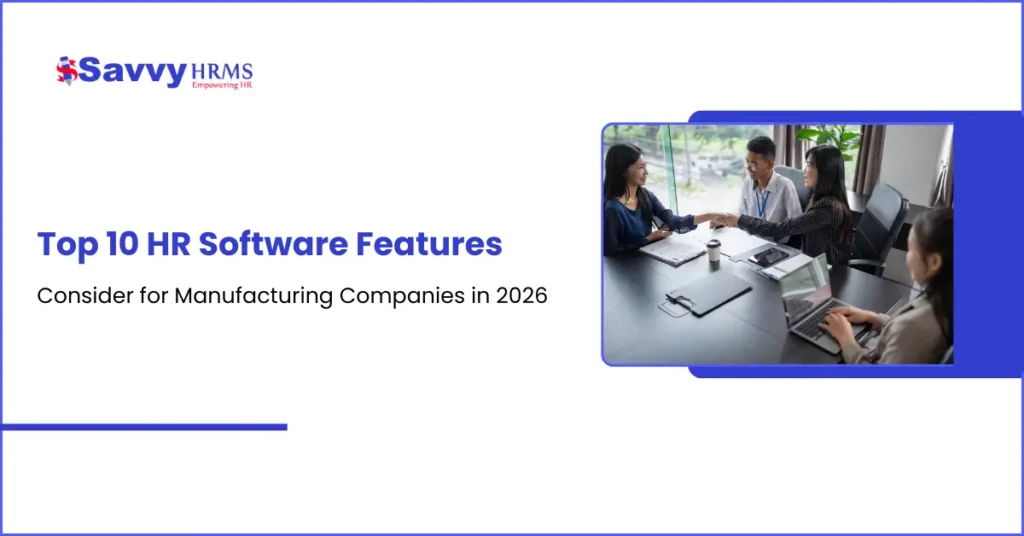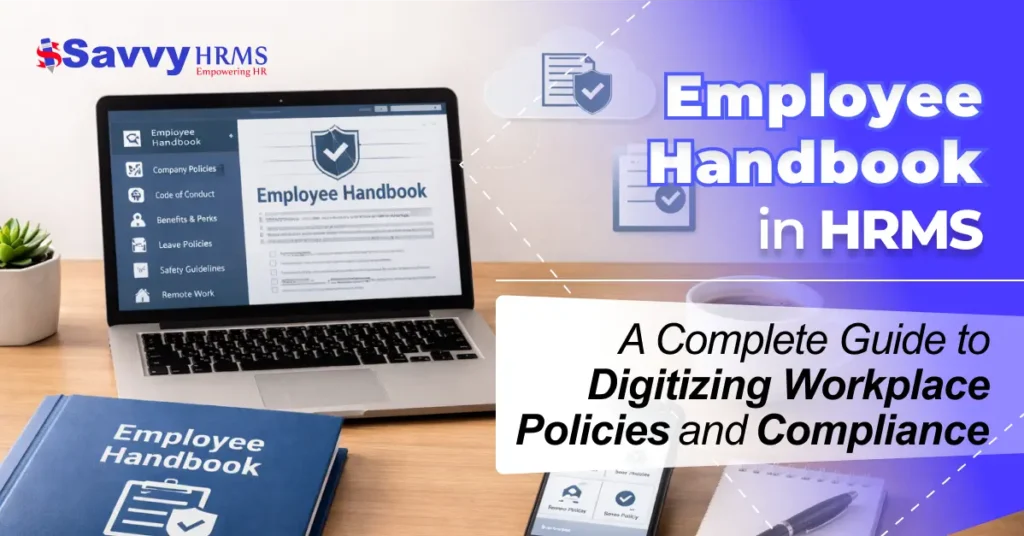The manufacturing company stands out to be a foundation of the modern financial system, delivering products that shape the daily lives and keep the world moving forward. Behind every progressive meeting, robotics work area, and quality checkpoint, a dedicated employee drives efficiency, safety, and innovation in the industry. However, managing this large human capital presents some unique issues, with multiple shifts and rostering, complex compliance requirements, and the need for overtime pay calculations.
The traditional HR process depends on manual work or disconnected systems, which often results in inconsistencies, delays, and increased risk. In this demanding business environment, HR software offers digital solutions to manufacturing companies by transforming how they recruit, manage, and engage their different teams. The right HR solution keeps operations comfortable, employee data centralized, and difficult decisions supported by real-time analytics.
In this blog, we will explore what HR software means for manufacturing companies, why it is important, and how to select the right solution for your organization.
What Is HR Software in Manufacturing Companies?
HR software in manufacturing companies is an integrated, digital, and automated system that automates and simplifies HR processes unusual to productive environments. Unlike general HR tools, these solutions point out particular manufacturing workflows, like shift management, labor cost, tracking of safety certification, workforce scheduling, shifts and rostering, labor costing, and managing blue-collar vs white-collar employees efficiently.
This software acts as a combined centre for all employee data, connecting various plant managers, HR teams, and key workers across different locations and shifts. With modules such as compliance automation, shift management, and digital training systems like Skill Matrix and DOJO training, HR leaders can simplify the daily operations and ensure factory preparation.
Top 10 Features of HR Software in the Manufacturing Industry
1. Automated Payroll Management
Payroll management software in manufacturing industries includes calculating shift variations, overtime pay, bonuses, and deductions with complete accuracy. Automated payroll modules ensure everyone is paid timely and correctly, eliminating manual errors and the burden of the complicated payroll process for HR professionals.
2. Compliance Management
Manufacturers manage under strict safety and new labor laws. HR software automates compliance management by tracking combined laws and regulations, certification renewals, statutory requirements, and sustainability-related metrics like Carbon Emissions. It brings automated alerts and updates, helping organizations to avoid penalties and maintain industry certifications.
3. Attendance and Shift Scheduling
With multiple shifts running continuously, a digital attendance management system and automated shift scheduling are important for them. These features record punch-ins through biometrics or mobile apps, reduce attendance fraud, and improve labor patterns to meet productivity targets without overstaffing within the organization.
4. Recruitment and Onboarding Tools
High turnover and increased hiring processes are common in manufacturing companies. Integrated candidate tracking and digital onboarding simplified recruitment management, reduced manual work, and helped new candidates to complete formalities efficiently before stepping into the manufacturing company.
5. Real-Time Workforce Analytics
Access to practical employee insights enables plant leaders and HR managers to understand records such as absenteeism, project needs, training needs, and overtime model. Custom dashboards identify data for active decision-making.
6. Performance and Productivity Tracking
Automated performance management system allows managers to track employee KPIs, run regular promotions, and reward high performers. Tools like Employee surveys help to improve output, motivation, and accountability across various departments within the organization.
7. Time & Attendance Integration with Payroll
Integrating time-tracking data directly into payroll ensures every hour worked or missed is correctly reflected in paychecks. This feature reduces conflicts, speeds up payroll processing, boosts accuracy in overtime pay, and supports continuous improvement.
8. Training and Certification Management
Maintaining a skilled and certified employee is a legal and operational necessity in a manufacturing company. HR software tracks training progress, renewals, and safety certifications automatically, ensuring employees are always compliant and prepared for their roles and responsibilities.
9. Document Management System
From safety directions to visitor logs and employment contracts, manufacturing HR involves a particular amount of documentation. A secure, digital document management system stores, recovers, contractor management documents and safeguards important records while supporting audits and accountability.
10. Mobile Accessibility and Self-Service
With employees usually working off-site, mobile accessibility ensures employees can view schedules, request time off, update details, or complete online learning from any device. Self-service portal improves engagement and reduces HR’s daily administrative paperwork.
Why Use HR Software for Manufacturing Companies?
Manufacturing companies benefit from HR software by gaining efficiency and visibility across various levels of their employees. Here’s why digital transformation is important for today’s factories and industries:
1. Centralizes Employee Data
All employee records, from onboarding to exit, across blue-collar vs white collar employees, are in just a single, easily accessible database, eliminating storage and repetition. This combination improves data accuracy and simplifies smooth collaboration across various departments.
2. Improves Compliance
Automatic tracking and reporting on industry regulations, labor laws, and safety certifications, and carbon emission reports keep your organization always audit-ready. It also helps to reduce the risk of penalties and legal complications by ensuring timely updates and compliance with changing standards.
3. Saves Time and Costs
Automation minimizes manual paperwork, shortens payroll process and scheduling cycles, and reduces costly human errors. This efficiency allows HR leaders to focus more on strategic leadership rather than administrative tasks, ultimately decreasing operational expenses.
4. Enhances Productivity
Well-organized shift scheduling, performance monitoring, and needed training, such as skill matrix and DOJO training, translate directly to improved industry output. By improving employee allocation, organizations can meet productivity demands without extending resources.
5. Support Communication
Integrated messaging and employee surveys ensure that important updates reach all employees, even across distributed plants. This continuous flow of information boosts a merged organizational culture and reduces miscommunications.
6. Boosts Employee Engagement
Employee self-service portal and transparent HR processes increase employee satisfaction, maintenance, and motivation. Employees feel empowered and valued when they can manage their own information and requests easily.
7. Enables Strategic Decisions
Real-time insights give leaders and HR teams the analytics needed to improve labor, manage costs, and plan for growth within the organization. Data-driven decision-making supports active management and continuous improvement.
How to Select HR Software for Manufacturing Companies?
1. Assessing organizational needs for HR software
Selecting the right HR software for a manufacturing company needs a careful assessment of organizational requirements, shift difficulties, unsolved challenges, employee models, and future growth plans. Start by focusing on key needs such as multiple sites management, compliance, language accessibility, and employee availability across various locations.
2. Choosing HR solutions with strong operational capabilities
Prioritize HR solutions that offer powerful modules like automated payroll with overtime calculations, compliance tracking, and smooth integration with existing systems. Savvy HRMS works in these areas and handles the entire Hire-to-Retire process, from recruiting and onboarding to payroll, performance, and exit formalities, ensuring minimal manual effort and maximum accuracy.
3. Evaluating through demos and cross-team reviews
During evaluation, request demos and involve IT teams and various departmental contributors to review reporting capabilities, usability, and real-time support. Savvy HRMS gives automated features for manufacturing environments, including shift management, overtime rules, geo-based attendance, and multiple locations. It supports organizations with 25,000+ employees, making it suitable for both mid-sized and large enterprises looking for scalability.
4. Prioritizing support, implementation, and long-term growth
Finally, customer support, implementation quality, and long-term service should impact decision-making. Look for platforms with case studies from manufacturing clients and a strong commitment to training and updates. Savvy HRMS provides guided onboarding, continuous support, and regular improvements to ensure your HR operations grow efficiently with developing regulations, employee models, and technology needs.
Conclusion
The manufacturing organization’s success depends on the quickness and efficiency of its workforce. Depending on outdated or manual HR processes expose the risk, inefficiency, and lost opportunities for growth within the organization. By investing in automated HR software, manufacturers set up a foundation for organizational excellence, shift management, and overtime pay automation, making every task of HR, from payroll to talent development, simply integrated and responsive.
In a company driven by accuracy and productivity, the right HR solution like Savvy HRMS doesn’t just solve manual errors; it empowers your entire employees to perform at their best, now and in the future. As manufacturing continues to develop with automation and digital technologies, adopting advanced HR software is no longer an option but a strategic process for long-term competitiveness and success across various companies.




